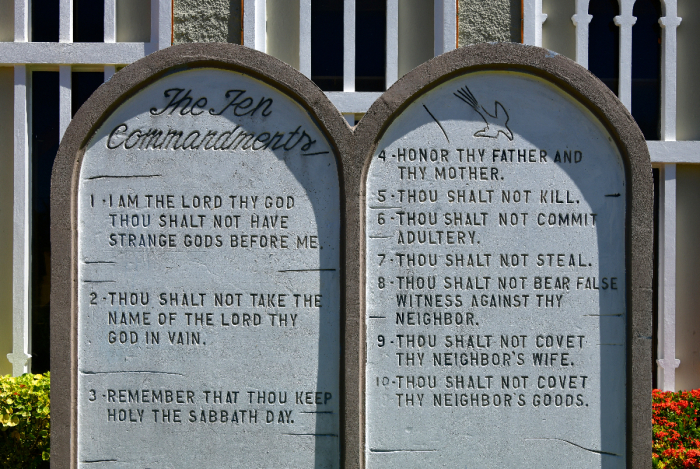Judge blocks Louisiana from displaying Ten Commandments in classrooms

A federal judge has temporarily blocked a recently passed Louisiana law that would require public schools to display the Ten Commandments in their classrooms.
U.S. District Judge John W. deGravelles issued a lengthy ruling and order on Tuesday in the case of Darcy Roake et al. v. Cade Brumley et al.
At issue is Louisiana's House Bill 71, signed into law in June, which would require Decalogue displays in public school classrooms. The law was slated to take effect on New Year's Day.
"Plaintiffs have established a viable Free Exercise claim," wrote deGravelles. "H.B. 71 is not neutral toward religion, and this is evident from the text of the statute, its effects, and the statements of lawmakers before and after the Act's passage."
The judge took issue with the defendants' claim that the Ten Commandments were a historically integral part of public education in United States history.
"In sum, the historical evidence showed that the instances of using the Ten Commandments in public schools were too 'scattered' to amount to 'convincing evidence that it was common' at the time of the Founding or incorporation of the First Amendment to utilize the Decalogue in public-school education," deGravelles continued.
"That is, the evidence demonstrates that the practice at issue does not fit within and is otherwise not consistent with a broader historical tradition during those time periods."
The American Civil Liberties Union, which helped to represent nine Louisiana families with children in the state public school system, released a statement celebrating the ruling.
"This ruling should serve as a reality check for Louisiana lawmakers who want to use public schools to convert children to their preferred brand of Christianity," said Heather L. Weaver, senior staff attorney for the ACLU's Program on Freedom of Religion and Belief, as quoted in the statement.
"Public schools are not Sunday schools, and today's decision ensures that our clients' classrooms will remain spaces where all students, regardless of their faith, feel welcomed."
Signed into law by Louisiana Gov. Jeff Landry, HB 71 requires public school classrooms to display "certain historical documents," among them the Ten Commandments, the Mayflower Compact, the Declaration of Independence and the Northwest Ordinance.
"Recognizing the historical role of the Ten Commandments accords with our nation's history and faithfully reflects the understanding of the founders of our nation with respect to the necessity of civic morality to a functional self-government," stated the legislation.
"Including the Ten Commandments in the education of our children is part of our state and national history, culture, and tradition."
Soon after, the ACLU, the Freedom From Religion Foundation and Americans United for Separation of Church and State filed suit against the law on behalf of an interfaith group of parents.
"[F]or nearly half a century, it has been well settled that the First Amendment forbids public schools from posting the Ten Commandments in this manner," read the complaint.
"Plaintiffs seek a declaratory judgment that the Act is unconstitutional and preliminary and permanent injunctive relief to prevent Defendants from (i) implementing rules and regulations in accordance with the Act, (ii) otherwise seeking to enforce the Act, and (iii) displaying the Ten Commandments in any public-school classroom."
Louisiana Attorney General Liz Murrill championed the new law on social media in June, explaining that she would be honored to defend the legislation in court.
"The 10 Commandments are pretty simple (don't kill, steal, cheat on your wife), but they also are important to our country's foundations," she tweeted.
"Moses, who you may recall brought the 10 Commandments down from Mount Sinai, appears eight times in carvings that ring the United States Supreme Court Great Hall ceiling. I look forward to defending the law."
In 1980, the U.S. Supreme Court issued a 5-4 opinion in the Stone v. Graham ruling that Kentucky could not mandate that public schools display the Ten Commandments because it violated the Establishment Clause of the First Amendment.





























